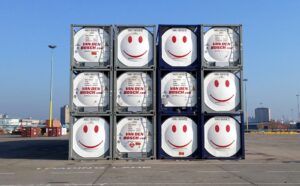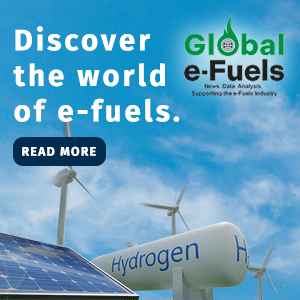Expanding horizons

“Moreover, it reinforces our innovative character as we are now able to clean locally and thus operate more sustainably.”
The new tank cleaning station in the Ivory Coast will enable the logistics service provider to set up new transport flows from Africa to the rest of the world.
The cleaning station was opened in Abidjan, the biggest city in African republic, and was built in full compliance with strict European quality standards.
It also meets all the food, kosher and halal cleaning requirements.
This is Van den Bosch’s second cleaning station in Africa - following on from the first one which opened in Ghana in 2016.
Quality standards
“The cleaning station quality standards enable us to focus on sustainability, bulk solutions and the further development of import and export flows.
“Until now, it wasn’t always possible to unload and then immediately reload, due to the lack of professional cleaning possibilities in West Africa.
“The new cleaning operation will help to balance incoming and outgoing transport flows and this will mean less empty running,” added Van de Vorst.
Valued partnership
Van den Bosch is working with Lynx Logistics as part of the new tank cleaning operation. They are a local partner with extensive experience in forwarding and customs clearance for the mining industry.
Ivorian Marc Moukarzel, a director of Lynx Logistics, said: “The cooperation with Van den Bosch gives us the opportunity to increase our presence in the container industry. We appreciate the keen commitment of Van den Bosch to this partnership, to which both parties are contributing experience and flexibility. I look forward to developing our cooperation further in the future.”
Developing partnerships
According to Van den Bosch, it is now one of the biggest tank operators for the food industry in the world.
The focus is on the African market, with an emphasis on shipping liquid foodstuffs, such as olive and sunflower oil, ethanol and glucose, in ISO tank containers.
Van de Vorst concluded: “With this investment, we are meeting the needs of our customers and the manufacturers in Africa.
“In this way, we are working on increasing sustainability and connecting Africa with the rest of the world, while continuing to build on our position as The Supply Changer in Bulk.”
Van den Bosch has also entered into a partnership with the CSTT-AO Group in Senegal.
The logistics service provider is further expanding its network in West Africa through this partnership with the focus on liquid bulk logistics.
The CSTT-AO Group started in 1949 as a family business, set up for trade to and from Africa.
With over 75 years of experience in logistics, the company has built a solid reputation focusing on supply chain management and integrated logistics solutions.
“Working with CSTT in Senegal will enable us to further develop the West African market,” said Mark Ashton, commercial director of Van den Bosch DMCC.
“Increasing our presence and working with the right partners is essential to our strategy of redirecting traditional transport flows towards more sustainable bulk transport solutions.
“We see significant potential in West Africa in liquid bulk for the food industry, meaning foodstuffs, but also vegetable oils, for example.”
Ashton said the first tanks had already arrived in the African country.
“With our French-speaking sales team, we see opportunities to further connect Senegal with the rest of Africa, but also with Europe and the Far East. CSTT’s leading position and experienced team are the recipe for us to successfully achieve our goals.”
Joaquin Gomez, CEO of the CSTT-AO Group’s Logistics Division, said he was proud of the new partnership, adding
“We are delighted with their confidence in the new adventure. This partnership strengthens the position of both parties with regard to innovative solutions for the development of the local economy in Senegal.
“The mutual trust and support will inspire our organisations to look to the future together and to develop our leading position in liquid bulk logistics in Senegal.”
Emission requirements
Van den Bosch has also become the first carrier worldwide to be independently verified for carbon emission calculations and reporting that meet the applicable requirements from ISO 14083:2023.
This confirms that carbon emissions are calculated and reported in a demonstrably reliable manner, fully in line with European legislation and environmental requirements.
Since the first quarter of last year, there has been an international standard for allocating carbon emissions from activities in the transport chain - ISO 14083. Based on these requirements, logistics companies and their service-providers can clearly calculate, allocate and share their carbon footprint within the chain.
Van den Bosch achieved the result following an independent review by LRQA, with its carbon calculation meeting the requirements of ISO 14083.
LRQA is an organisation with expertise in certification, accredited to the ISO 17021 standard.
Van den Bosch was part of a pilot group set up by Topsector Logistiek. Topsector Logistiek is a tripartite partnership between people from the business community, science and the government.
The pilot group was set up in order to translate the ISO standard into a practical guide which also included a self-assessment questionnaire (SAQ) for assessing ISO 14083 within the organisation.
“The verified carbon calculation means that we can meet customer requirements by being able to allocate CO2 emissions to specific shipments, modalities and suppliers, for example, in accordance with the standard,” said Brecht den Otter, sustainability specialist at Van den Bosch.
“Besides this being a milestone in terms of our carbon calculation, it also represents a step forward on our route to 2030 where sustainability is a major focus.
“We can be proud of this achievement which fits in precisely with our sustainability concept from that strategy. We are now able to set realistic carbon reduction targets for 2030.”
For more information: Visit: vandenbosch.com









